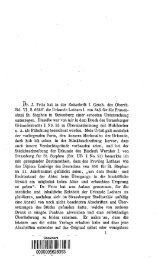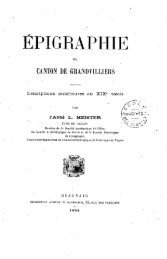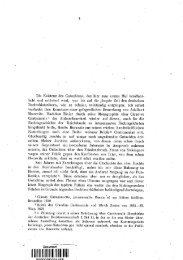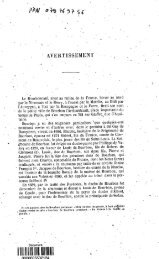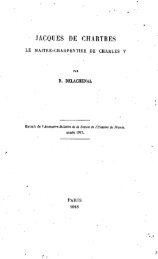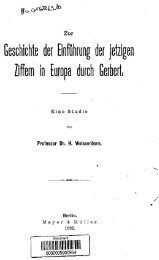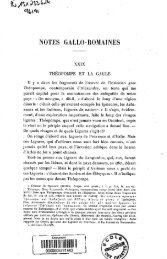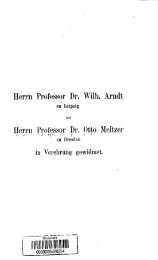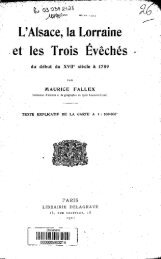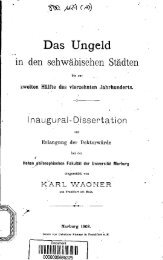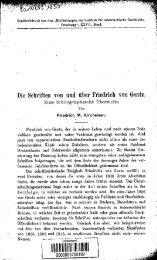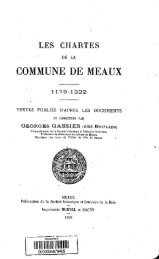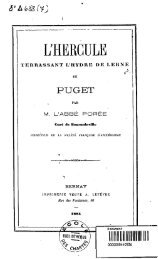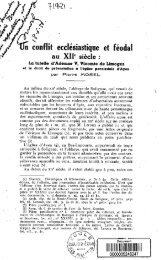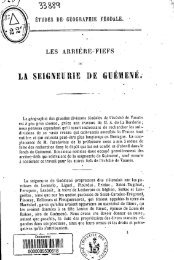4P Li gç(' TRANSACTIONS
4P Li gç(' TRANSACTIONS
4P Li gç(' TRANSACTIONS
You also want an ePaper? Increase the reach of your titles
YUMPU automatically turns print PDFs into web optimized ePapers that Google loves.
VOL. 47, PT. 5, 1957] ORESMES VERSION AND ENGLISH TRANSLATION 817<br />
T. Item, quant est (IC l'aournement des manes, aussi<br />
comme ii ne convicflt pas qu'il apl)rOCe flt ensemble par<br />
manage esleVés en incurs, semblablement ii ne convient<br />
pas qu'il soient eslevés en habit de leur corps.<br />
C. Selon une exposition, eslevés cc est a dire differens<br />
et discordans. Et (lonques ii doivent estre conformes en<br />
meurs et en habit, car se le niari estoit trop court,' ]'ell<br />
diroit quil anieroit une autre; et ainsi de la femme. Et<br />
par aventure, ii veult (lire qu'il tie doivent pas estre eslevés<br />
et orgueillcus ne ell tie en apparance de vestemens.<br />
T. Car en tel apparat que ont le homnie et la femme<br />
qui sunt ensemble par manage, tel aournernent ne differe<br />
en rien des parlers que l'en seult faire es tragedies.<br />
C. Cc est a dire que tel excés de cointise est laide chose<br />
et deshoneste, aussi coninie sunt les paroles de tragedies.<br />
Ou scion une autrc exposition, te- /1 (334a) le chose<br />
donne acheson die parler en ma!, aussi comnle !en pane Cs<br />
tragedies. Cc sunt dicties et runes de choses villaines et<br />
deshonestes. Et est dit die tragos ell que est bouc ou<br />
beste puante; car en signe des ordes paroles et diffamees<br />
que len disoit en teles rimes, len donnoit un bouc.<br />
5. Ou quint chapitre ii met enseignentens ou resgart des<br />
sers,<br />
T. Des possessions la premiere chose et in phis neceSsaire<br />
est celle qui est tres bonne et tres principaie, 1 et ce<br />
est honirne.<br />
C. La femme et les enfans ne sunt pas 2 proprement possession.<br />
Mes il appert par Ic tiers chapitre du premier de<br />
Politiques que le serf est possession propremcnt et un instrument<br />
vif et qul se meut par soy et est simplement et<br />
absoluetnent la chose du seigneur. Et pour cc (lit 1'Apostle:<br />
Servus domino suo stat nut cadit.<br />
T. Ft pour ce est bien de ordener prenueremeni. (PlC<br />
les serfs soient vertueus et bons.<br />
C. Et cc ne est pas a entendre (IC vertus panfeictes, tiles<br />
de teles vertus cofllnle serfs pevent et doivent avoir. Ft cc<br />
fu determine et declare ou .xvi. * chapitre du premier de<br />
I'olitiqucs. Apres ii met une distinction.<br />
T. Et toutesvoies, de serfs sunt ii. especes: le curateur<br />
et le operateur.<br />
C. Car selon cc qu'ii appert par le premier et par Ic<br />
quint chapitres du premier de Politiques, aucuns sunt serfs<br />
de nature et par nature et ne ont pas prudence de considerer<br />
et resgarder que est a faire, Tiles ii sunt rudes et<br />
fors et telz sunt operateurs. Et funt les cevres serviles et<br />
ont mestier d'aucun qui les ordene et adrece / (334b) et<br />
que il leur commande cc (lull doivent faire. Et tel est<br />
appellé curateur ou procureur; car Si conlnie ii appert OU<br />
quint chapitre du .vii.' de Politiqucs, commander ovres<br />
serviles ne est pas chose honorable. Ft pour cc, si comme<br />
il appert ou .vii. chapitre du premier de Poliliques, les<br />
seigneurs puissans entendent a operations honorables et ont<br />
leur procureur qui commande as serfs. Et en Politiques<br />
tantost (levant est allegué Un proverbe ancien, que serf est<br />
devant serf et seigneur devant seigneur; car tel curateur<br />
est moien entre le seigneur et ceulz qui sunt proprement<br />
serfs. Et est seigneur ou resgart de eulz et serf ou resgart<br />
du seigneur. Ft cc est en grande maison, car en<br />
T. As to the adornment of the married couple, just<br />
as it is best that they enter the married state before<br />
their habits have become fixed, likewise it is best that<br />
they should not depend upon bodily adornment to enhance<br />
their attractiveness.<br />
G. One commentator explains this to mean that they<br />
should not he different and discordant in bodily size. And<br />
thus they should he of similar habits and similar in physical<br />
appearance, because if the husband were too short, people<br />
would say he should love some other woman and likewise<br />
for the wife. Possibly he means that the couple<br />
should not be proud and haughty either in behavior or in<br />
their manner of dress.<br />
T. For the outward adornment of the couple may be<br />
no different from the speeches commonly associated<br />
with tragedies.<br />
C. That is to say that such an excess of affectation is<br />
ugly and unseemly, like the words used in tragedies. Or according<br />
to another commentator, // (334a) such a thing<br />
gives opportunity for evil tongues, such as one hears in<br />
tragedy. Tragedies are ditties and rimes about base and<br />
improper things. And the word is derived from tragos in<br />
Greek, nieaning goat or stinking animal, because to symbolize<br />
the filthy words and scandal of these rimes, a goat<br />
was sacrificed-<br />
5. In the fifth chapter he gives precepts zd'if It respect<br />
to slaves.<br />
T. The first andmost essential item among possessions<br />
is that which is most indispensable and that is<br />
man himself.<br />
C. The wife and children are not properly possessions.<br />
But it is evident from Politics 1, 2 [1253b 33 1 that the<br />
slave is properly a possession and a living, self-motivating<br />
instrument and lie is simply and absolutely the property of<br />
his master. Whence the Apostle Paul says: "The slave<br />
stands or falls before his master" [Rom. 14: 4].<br />
T. The first step should therefore be to see to it that<br />
the slaves are virtuous and good.<br />
C. This must not lie Understood! to imply that they must<br />
have perfect virtue, but only such virtues as slaves can and<br />
should possess. And this was discussed in Politics I, 5<br />
[12591) 22 if.]. Next lie makes a distinction.<br />
T. Of slaves there are two kinds: the caretakers and<br />
the laborers.<br />
C. From the text of Politics I, I and 2 [1252a 34, 12551)<br />
35], it appears that some men are slaves naturally or by<br />
nature and have no prudence to observe and judge what is<br />
required to be done, being merely coarse and strong. Such<br />
are the laborers who perform servile tasks and need smiteone<br />
to order thenl about and direct them / (334b) as to<br />
what they should do. And this someone is called the caretaker<br />
or manager. For in Politics VII, 3 [1325a 271 it<br />
appears that the ordering of servile tasks is not honorable<br />
and it seems from Politics I, 2 11255b 351 that powerful<br />
lords attend to the honorable tasks and have a manager to<br />
direct the slaves. And a little before this passage in Politics<br />
[1255h 30] he refers to an ancient proverh, that one<br />
slave is above another and one lord before another; for<br />
the manager occupies a positionbetween the master and<br />
those who are actually slaves and! the manager is lord with<br />
respect to the slaves and a slave to his master. This applies<br />
to a large estate only, because on a small estate the



